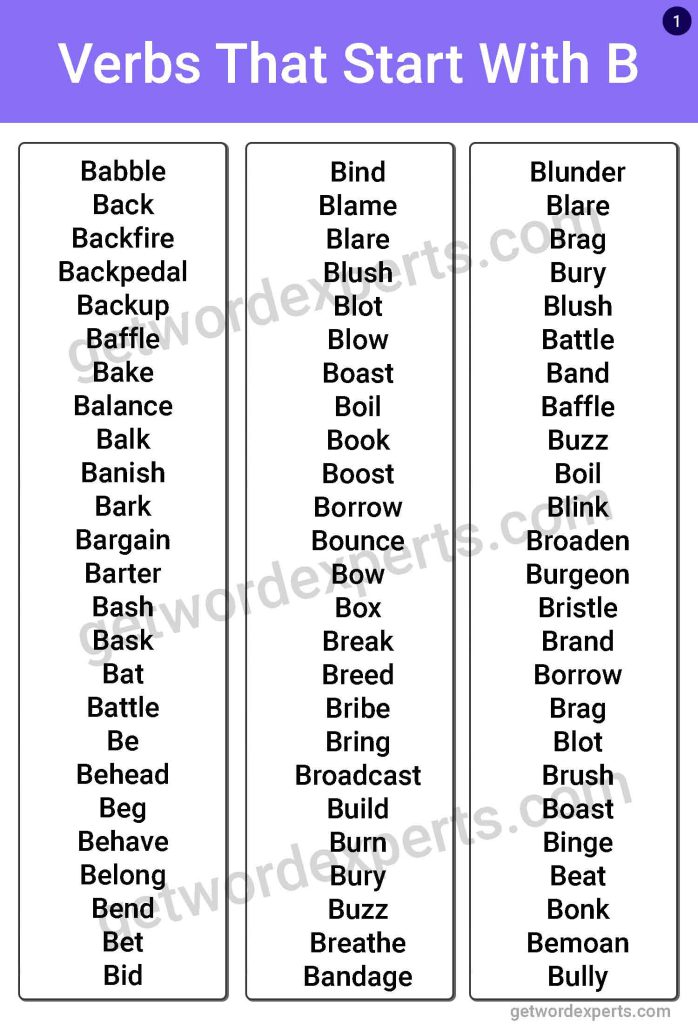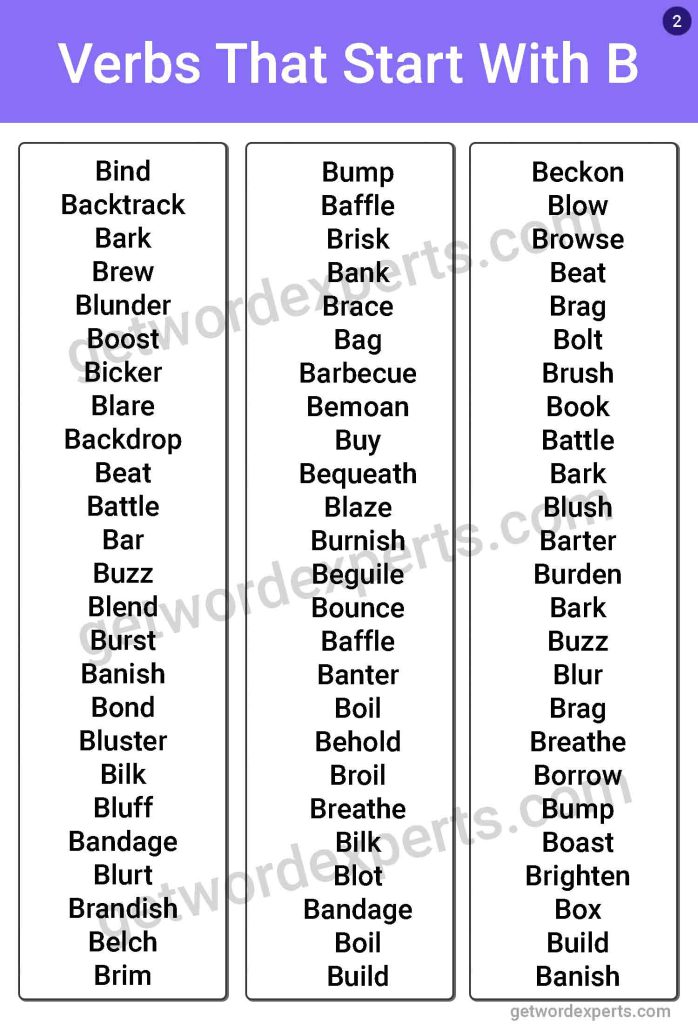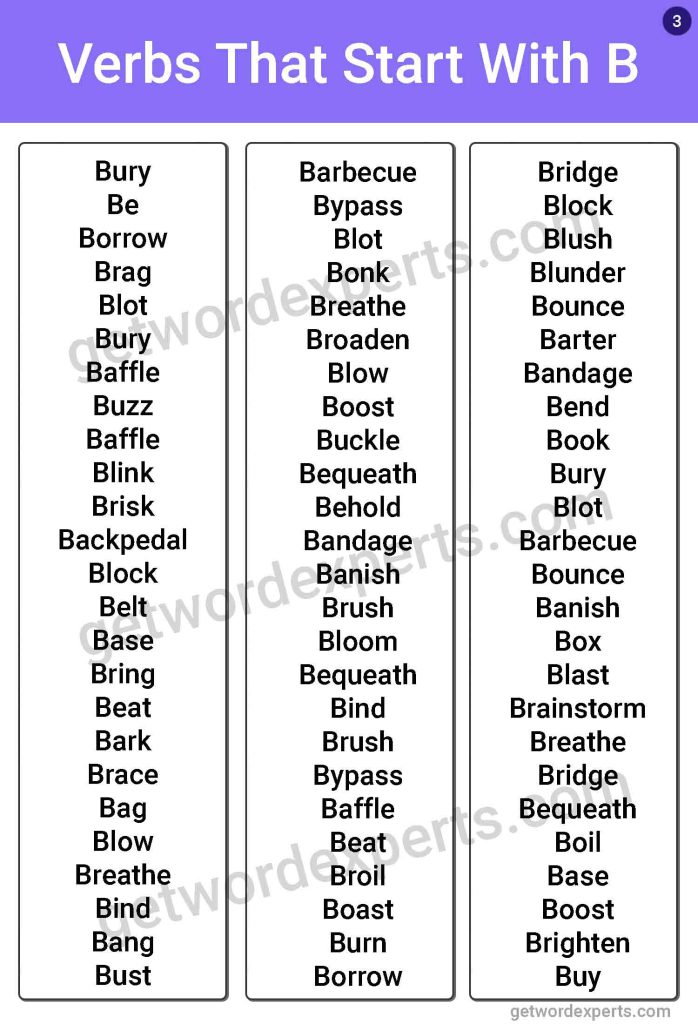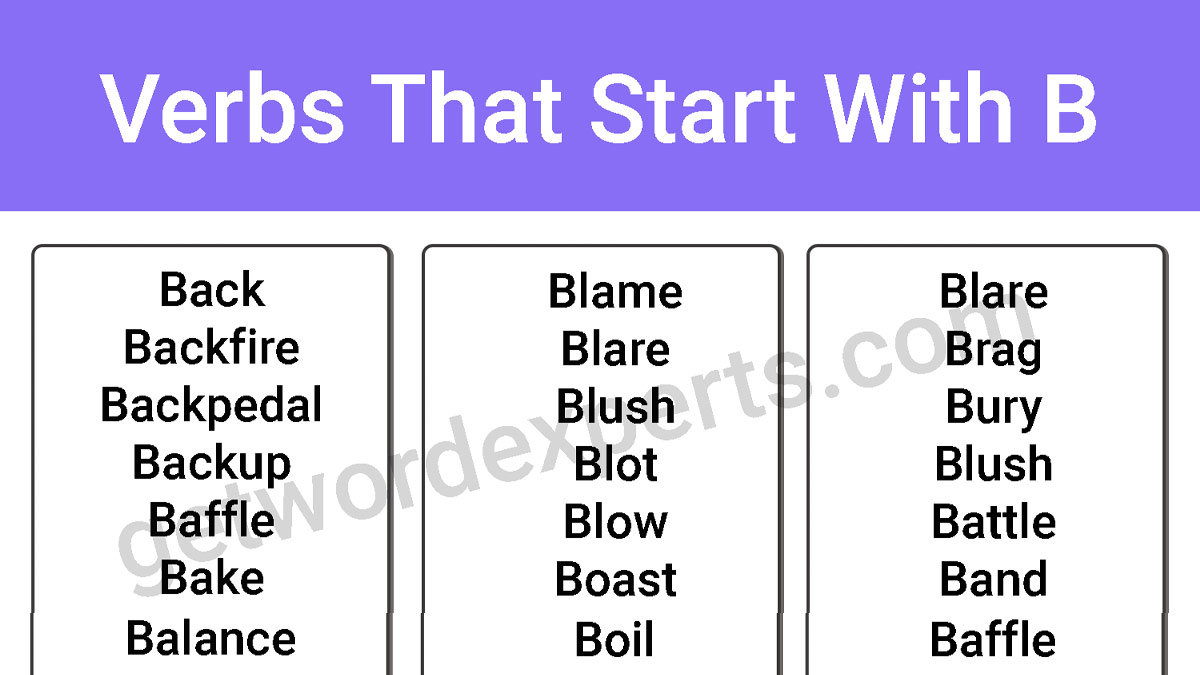Verbs are the driving force behind any sentence, breathing life into our communication by showing action, movement, or a state of being. Understanding the variety of verbs, especially those verbs start with ‘B’, helps us elevate our language and add depth to our expressions. From building bridges to breaking boundaries, verbs that start with ‘B’ offer endless ways to convey dynamic actions and ideas. In this blog post, we’ll explore an exciting range of ‘B’ verbs that will enhance your vocabulary and bring your writing to life. Let’s jump in and discover these action-packed words!
Understanding Verbs That Start with B
Verbs that start with the letter ‘B’ hold a unique place in the English language. They originate from a distinct consonant, creating a bold and often action-driven tone. Unlike adjectives, which describe qualities or states, these verbs focus solely on actions or states of being. By using verbs that begin with ‘B,’ you’re tapping into powerful words that drive sentences forward, highlighting the activity or movement at the core of the message.

Basic Action Verbs That Start With B
These are everyday verbs that are simple & useful. They are frequently used in daily conversations and writing.
- Bake: To prepare food by cooking it with dry heat, typically in an oven.
- Bathe: To wash oneself or someone else.
- Build: To construct something by assembling parts.
- Buy: To obtain something in exchange for money.
- Boil: To heat a liquid until it reaches a temperature where bubbles form and it turns to vapor.
Descriptive Actions
Descriptive verbs provide more detail about the actions they describe. They add color and specificity to writing.
- Bicker: To argue about petty matters.
- Blush: To turn red due to embarrassment or shame.
- Bloom: To produce flowers.
- Bellow: To shout loudly.
- Babble: To talk rapidly and continuously.
- Movement-related Verbs
Strong Action Verbs That Start With B
Strong action verbs convey more intense or specific actions. They enhance the precision and effectiveness of your sentences.
- Bolster: To support or strengthen.
- Brandish: To wave or display something, often in a threatening or showy manner.
- Banish: To force someone to leave a place as a form of punishment.
Use of Action Verbs that Start with B
| Verb | Definition | Example Sentence |
| Balance | To maintain stability or equilibrium | She managed to balance the books on her head while walking steadily. |
| Bathe | To wash or immerse in water | He bathed the baby carefully in warm water. |
| Battle | To fight or struggle against | They battled intensely to gain control of the land. |
| Begin | To start or commence | The meeting will begin at 10 AM sharp. |
| Behave | To act in a certain way, typically good or bad | The children behaved well during the ceremony. |
| Bend | To curve or angle something | He bent the wire to create a heart shape. |
| Bet | To place a bet or risk something of value based on the outcome of an event. | She bet all her savings on the outcome of the race. |
| Bite | To clamp down with the teeth and cut into something | The child bit into the apple with excitement. |
| Blame | To accuse someone of being responsible for a mistake or wrongdoing. | He blamed his coworker for the error in the project. |
| Bleed | To lose blood from the body | His knee bled after falling off the bike. |
| Blend | To mix thoroughly together | She blended the fruits to make a smoothie. |
| Bless | To ask for divine favor or protection for someone or something. | The pastor blessed the newborn child during the ceremony. |
| Block | To prevent something from moving or progressing | He blocked the door to stop anyone from entering. |
| Blow | To expel air forcibly from the mouth | The wind blew through the open windows. |
| Boil | To bring a liquid to a temperature where it turns into vapor, creating bubbles. | She waited for the water to boil before adding the pasta. |
| Bounce | To spring back after hitting a surface repeatedly. | The tennis ball bounced off the court several times before it stopped. |
| Bow | To incline the upper body or bend forward as a sign of respect or submission.t | He bowed deeply before the audience at the end of the performance. |
| Break | To cause something to separate into pieces | She accidentally broke the vase while cleaning. |
| Breathe | To inhale and exhale air | He breathed deeply after finishing the race. |
| Breed | To produce offspring through reproduction | The horses were bred for racing. |
| Brief | To give a short summary of information | She briefed the team on the project updates. |
| Brighten | To make something lighter or more cheerful | The new paint color brightened the room. |
| Build | To construct or assemble | They built a house in the countryside. |
| Burn | To cause something to be consumed by fire. | They burned old documents in the backyard fire pit. |
| Burst | To suddenly break open due to pressure or force. | The balloon burst loudly when it hit the sharp edge of the table. |
| Buy | To acquire something by paying for it | She bought a new car yesterday. |
| Buzz | To make a low, continuous humming sound | The bees buzzed around the flowers. |
| Back | To support or endorse something | He backed the proposal to improve the community park. |
| Ban | To officially prohibit something. | The city council banned smoking in all public spaces. |
| Balance | To make two opposing forces or elements equal | She balanced work and family life effectively. |
| Bang | o hit something forcefully, making a loud noise. | He banged on the door, trying to get someone’s attention. |
| Bargain | To negotiate the price or conditions of a deal. | They bargained with the vendor to lower the price of the antiques. |
| Bark | To make a sharp, loud sound (typically by a dog) | The dog barked at the stranger passing by |
| Bar | To block or prevent entry or passage | He barred the window to keep intruders out. |
| Beg | To ask earnestly or desperately for something | She begged him to stay longer. |
| Borrow | To take something with the promise of returning it later. | She borrowed a book from the library for her research project. |
| Bind | To tie or fasten something securely | The contract legally binds both parties. |
| Browse | To casually search through information or items, often online. | She browsed the internet for new travel destinations. |
| Brief | To give necessary information concisely | He briefed the staff on the emergency procedures. |
| Burst | To break open suddenly due to pressure | The dam burst after days of heavy rain. |
Movement-related Verbs That Start With B
Movement-related verbs describe various forms of physical actions or changes in position. Here are some examples:
- Barge: To move forcefully or roughly.
- Bend: To change the shape by applying force.
- Bounce: To spring back or move quickly after striking a surface.
- Burst: To break open or apart suddenly.
- Bypass: To go around or avoid a place or obstacle.
- Bolt: To move suddenly and quickly.
Descriptive Verbs That Start With B
Descriptive verbs help paint vivid images in the reader’s mind. They add color and detail to your descriptions. These verbs can transform your writing. These verbs help you convey more precise actions and emotions.
- Bloom: To produce flowers or reach a stage of full beauty and growth.
- Blush: To turn red in the face, typically from embarrassment or modesty.
- Breathe: To inhale and exhale air through the lungs.
Communication Verbs
Verbs related to communication cover speaking, writing, and signaling. They are crucial for dialogue and interaction.
- Brag: To boast about achievements or possessions.
- Broadcast: To transmit information by radio or television.
- Beg: To ask earnestly or humbly.
- Banter: To exchange playful and friendly remarks.
- Brief: To inform someone thoroughly.
Emotional Verbs That Start With B
These verbs express feelings and emotions. They help convey the emotional state of characters or subjects.
- Bewilder: To confuse or puzzle someone completely.
- Beguile: To charm or attract someone, often through trickery.
- Bemoan: To express sorrow or disappointment over something.
- Belittle: : To make someone or something appear less significant.
- Befriend: To establish a friendly relationship with someone.
- Bewitch: To enchant or delight someone.
Work-related Verbs
Work-related verbs describe actions specific to tasks and jobs. They are useful for professional and career contexts.
- Budget: To plan the allocation of finances.
- Brainstorm: To generate ideas collectively.
- Benchmark: To evaluate something by comparison with a standard.
- Bill: To send an invoice for payment.
- Balance: To maintain stability or keep something in a steady position.
Unique And Rare Verbs
These verbs are less common but can add a unique flair to your writing. They often carry specific meanings.
- Besiege: To surround and attack a place.
- Brandish: To wave or display something, typically a weapon, in a menacing or dramatic way.
- Beckon: To signal someone to come closer, often with a gesture.
- Befuddle: To confuse someone, making them unable to think clearly.
- Bestow: To give something as a gift or honor.
Verbs Indicating Change
These verbs show transformation or change in state. They are vital for narratives involving development.
- Bloom: To develop or mature.
- Blur: To become less distinct.
- Broaden: To become wider or more extensive.
- Break: To separate into pieces.
- Boost: To increase or improve something.
Sensory Verbs
Sensory verbs relate to the five senses. They help describe experiences and perceptions vividly.
- Blink: To rapidly close and open the eyes.
- Buzz: To produce a continuous low, vibrating sound.
- Breathe: To take air into the lungs and release it.
- Burn: To be on fire.
- Burst: To break open or apart suddenly.
Verbs For Conflict And Resolution
These verbs are related to disputes, battles, and their resolutions. They are essential for conflict-driven narratives.
- Battle: To fight or struggle tenaciously.
- Banish: To send someone away as a punishment.
- Bargain: To negotiate in order to reach a mutually beneficial agreement.
- Bandage: To wrap a wound for protection.
- Bridge: To make a connection or fill a gap.
Exploring these verbs that start with B can significantly enrich your writing. They bring a variety of actions, emotions, and dynamics, making your text more engaging and precise.
Verbs That Start With B Infographics


Benefits Of Learning New Verbs
Learning new verbs expands your vocabulary. It also allows you to express yourself more precisely. Here are some benefits:
- Improve communication: Using varied verbs makes your speech and writing clearer.
- Enhance writing skills: A rich vocabulary leads to more engaging and descriptive writing.
- Boost confidence: Knowing more words helps you feel more articulate and confident in conversations.
Bonus Tips For Mastering Verbs
Mastering verbs requires practice and context. Here are some effective tips to help you learn and remember them:
- Read regularly: Exposure to different texts introduces you to new verbs.
- Practice writing: Use new verbs in sentences to reinforce your learning.
- Engage in conversations: Speaking with others helps you practice and remember new words.
Conclusion:
The letter “B” opens the door to a rich variety of verbs, each offering its own unique flair to your language. By familiarizing yourself with verbs that start with b, you can significantly enrich your vocabulary and enhance your grammar skills. Recognizing and incorporating these dynamic verbs into your writing will not only help you communicate with greater precision but also make your expressions more vivid and impactful. Embrace the power of verbs that start with b, and watch as your language abilities flourish, transforming your communication into something both intelligent and fluent.
What Are Common Verbs That Start With B?
Common verbs that start with B include bake, bring, build, and buy. These verbs are commonly used in everyday speech and play a key role in creating clear, concise communication.
How Do Verbs Starting With B Enhance Writing?
Verbs starting with B add variety and depth to writing. They make sentences more dynamic and engaging. Using diverse verbs improves readability and interest.
Can You List Action Verbs Starting With B?
Sure! Action verbs starting with B include bounce, break, boil, and burst. These verbs indicate physical actions and movement.
Why Are B Verbs Important In English?
B verbs are important because they are versatile and commonly used. They help in constructing meaningful sentences. They enhance both spoken and written communication.

